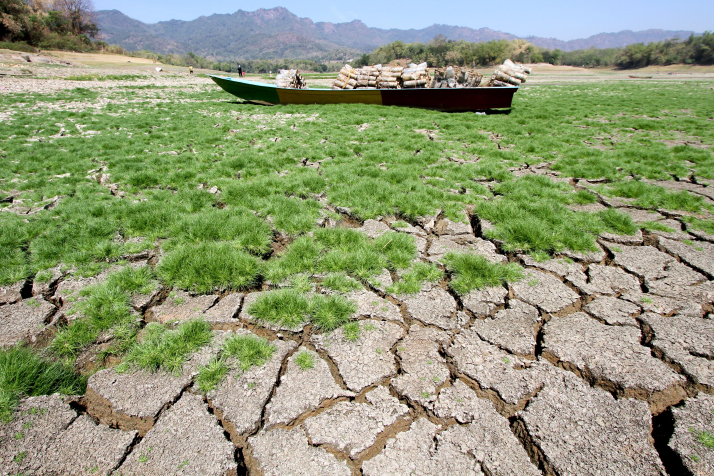
The 28th Session of the Conference of the Parties to the United Nations Framework Convention on Climate Change, or COP28, took place from November 30 to December 12 at Expo City, Dubai in the United Arab Emirates (UAE). World leaders gathered there to negotiate on slowing down and adapting to climate change, providing financial and technical support, synergizing sustainable development and climate action, and strengthening international cooperation and partnership in an attempt to bolster worldwide efforts to tackle climate change.
Global warming is one of the gravest challenges facing the world today. Global warming has led to the melting of ice caps in the Arctic and Antarctic, resulting in a roughly 20-cm rise in global sea levels since the 20th century. In December 2021, the Marine Academy of Zhejiang Province and the Second Institute of Oceanography affiliated to the Ministry of Natural Resources jointly conducted a study on the impact of rising sea levels in Zhejiang, an eastern coastal province of China. It reveals that from the 1960s to 2021, the average sea level in Zhejiang rose by 158 mm, with a noticeable increase in the rate of sea level rise in the past decade.
Global warming is attributed to the rise in greenhouse gases in the atmosphere caused by human activities. Over the past few decades, it has led to frequent extreme weather events and great damage to ecosystems. One of the primary global actions, therefore, focuses on reducing greenhouse gas emissions.
Nevertheless, given emission reduction measures involve aspects such as technology, funding and economic impacts, each COP consistently features ongoing debates. The United States, the world’s largest economy and most developed country, along with China, the second largest economy and largest developing country, inevitably took center stage once again at COP28.
Sunnylands statement
On November 15, China and the U.S. jointly released the Sunnylands Statement on Enhancing Cooperation to Address the Climate Crisis. It stresses the importance of COP28 in responding meaningfully to the climate crisis during this critical decade and beyond. China and the U.S. will accelerate action on climate, including practical collaborative programs and projects under the Working Group on Enhancing Climate Action in the 2020s. These actions also include recommencing bilateral dialogues on energy policies and strategies, carrying out exchanges on mutually agreed upon topics and enhancing pragmatic cooperation.
The statement expresses the commitment to further their dialogues, efforts and collaboration to support the UAE presidency for the success of COP28. The success of each climate conference, to a large extent, hinges on whether major countries can reach consensus before the meeting. For example, China and the U.S., both playing pivotal roles in global climate governance, issued three joint statements before COP21 in Paris in 2015, which contributed to the signing of the Paris Agreement.
This time, the two countries have reached consensus in the Sunnylands Statement on strengthening cooperation in addressing global climate change, including on energy transition, adaptation, methane, funding and the global stocktake (GST). The GST is considered as the first “report card” on the efforts by countries around the world to address the climate crisis.
These consensuses provide valuable references for countries during negotiations, enhancing efficiency, and laying a solid foundation for achieving outcomes at COP28.

Bolstering confidence
The top two economies’ decision plays a crucial role in providing leadership in the climate change issue and setting an example for countries to strengthen their own climate action and national contributions.
Disagreements remain between countries on the allocation of emission reduction responsibilities between developed and developing countries. Internal divisions also exist among affluent nations regarding finance and investment related to climate change.
In addressing climate change, China has established clear goals and a resolute attitude—striving to achieve peak carbon emissions before 2030 and carbon neutrality before 2060. This is a considerable challenge for a rapidly developing emerging economy.
China was among the first signatories of the 1992 United Nations Framework Convention on Climate Change and one of the founding countries of the Intergovernmental Panel on Climate Change (IPCC), the primary UN climate change research institution. China was one of the first developing countries to formulate and implement national plans to combat climate change. In June 2007, the Chinese Government released the National Climate Change Program, a national policy of resources conservation and environmental protection. It has long considered climate action to be a strategic aspect of national economic and social development.
In contrast, then-President Donald Trump announced in June 2017 that the U.S. will cease all implementation of the Paris Agreement, including the Nationally Determined Contributions and contributions to the Green Climate Fund. This undermined fairness and efficiency of global climate change cooperation.
After Joe Biden’s inauguration, the United States rejoined the Paris Agreement and strengthened cooperation with China on climate change. In the Sunnylands Statement, China and the U.S. reiterated their commitment to cooperation and joint efforts with other countries to address the climate crisis. Moreover, the 25-point consensus between China and the U.S. covers nearly all aspects of global climate change mitigation.
Despite the increasing complexity of Sino-U.S. relations in recent years, with numerous disagreements and contradictions, the two sides have exerted considerable effort in climate change cooperation. Against the backdrop of severe challenges in the bilateral relations and dramatic changes in the global geopolitical landscape, the two countries’ joint efforts on climate change provide hope and confidence to the international community, making it easier for countries worldwide to collaborate on addressing climate change issues. –The Daily Mail-Beijing Review news exchange item





